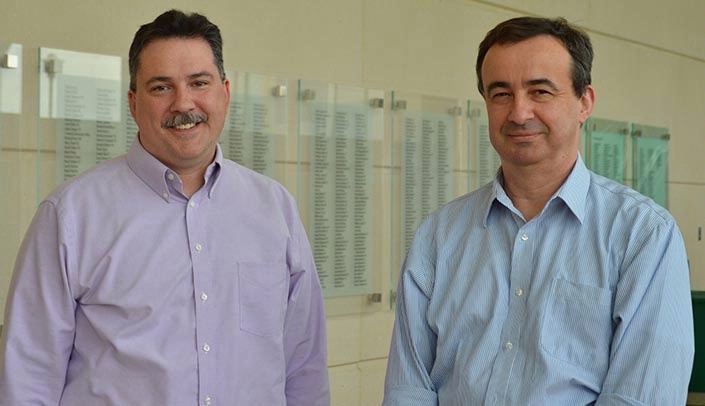EDITOR’S NOTE: In August, the UNMC College of Medicine will launch Training the Physicians of Tomorrow (TPT), a new active learning-based curriculum that emphasizes hands-on learning techniques, small-group interaction, technology and research and inquiry.
Approximately 100 faculty members participated in redesigning the new curriculum, including Fedja Rochling, M.B.B.C.H., gastrointestinal, and Justin Mott, M.D., Ph.D., biochemistry and molecular biology, who co-led efforts to redesign the gastrointestinal block. Here’s what they learned along the way:
Redesigning curriculum: The gastrointestinal block
What challenges has TPT presented you, as an educator?
Understanding how our students learn and retain information is an ongoing challenge. Can we present the topics in a way that is meaningful and memorable? At least eight gastrointestinal organs participate in nutrient digestion and absorption and regulation of whole body metabolism. We are fortunate to have a strong team of educators and practitioners of both basic science and medicine who have helped address the challenges in designing the GI curriculum.
How will TPT change the way students learn your specialty?
The new GI block covers healthy function as well as disease processes of the digestive tract. This includes a number of concepts, from basic science to clinical decision making that must be appreciated as interacting parts. The new block design will allow students to see the interaction of these parts in a single educational exposure. Thus, the GI block will associate digestion and nutrition with biochemical pathways; injury and repair with pathologic insults. Our approach draws from many disciplines to build to a general understanding of how the gastrointestinal system functions and how it can lose those functions.
What cross-disciplinary aspects are present in your block and how has that made the gastrointestinal block more robust?
We will require our students to focus on basic mechanisms of biochemistry, cell biology, physiology and nutrition. Additionally, we will ask them to turn their attention to organ and cell pathology, patterns of disease, prevention and treatment. The integration of these basic and applied disciplines will provide students with the foundation to understand mechanisms of GI disease. Each of these disciplines helps to form a basis for understanding GI patient care, a goal that awaits them in the next phase of their medical education.
Based on your curriculum redesign experience, what advice would you give colleagues as they navigate changes in health care education?
This process has been made easier by a team approach. Seek input from those you trust and find new contributors who have the passion to teach. Broad topics require input from disparate points of view, while specific tasks are often best performed by a small group (one to four people).

Great! We look forward to learning the best practices for our entire enterprise. Our missions are wonderfully intertwined and the stakes are high: training tomorrow's physicians today to the needs of our patients must be led by physicians and not special interest groups. We must be more efficient and effective!! EMRs and oversight must make the job easier and better. It's a team effort!! John Bertoni MD PhD